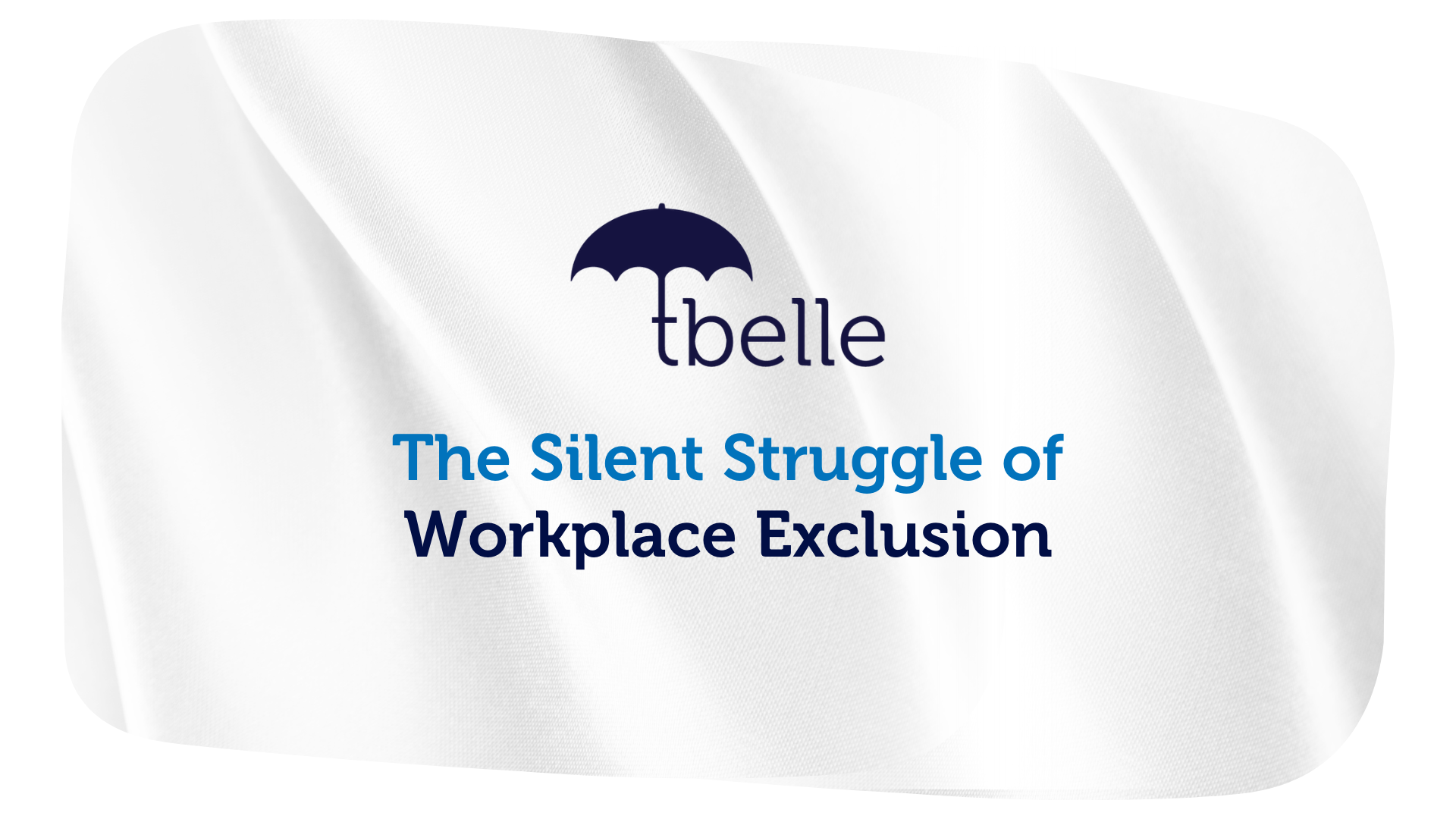Ever sat in a meeting where your ideas were overlooked? Or watched a group chat light up with discussions you were never included in? Workplace exclusion isn’t always obvious—it’s often subtle, unintentional, and easy to dismiss. But the truth is, feeling like an outsider at work can be incredibly frustrating, isolating, and demotivating.
At Tbelle, we’ve seen how exclusion, whether social or professional, can impact employee engagement, productivity, and even career growth. No one wants to feel like they’re just clocking in and out, disconnected from the bigger picture. The good news? We can change that through Workforce Integration.
Why Does Workplace Exclusion Happen?
Workplace exclusion isn’t always intentional, but its effects are real. Whether it’s social, professional, or even structural, exclusion can create an environment where employees feel disengaged and undervalued. It often stems from ingrained company habits, unconscious biases, or outdated workplace
Unintentional Cliques and Social Groups – People naturally form bonds with those they interact with most, whether through shared interests, common backgrounds, or simply working in close physical proximity. While this can create strong team camaraderie, it can also unintentionally alienate those who don’t fit into these informal groups. Over time, these social circles can become exclusive, making it harder for newcomers or individuals from different backgrounds to integrate.
Employees who feel like outsiders in these unspoken workplace hierarchies may struggle to have their voices heard or feel disconnected from decision-making and team culture. Whether it’s shared interests, background, or simply proximity in the office, these informal social circles can become exclusive over time, leaving some employees feeling like outsiders.
Remote Work and Physical Barriers – With the rise of remote and hybrid work, digital disconnects have become more prevalent, creating new challenges for employee engagement and collaboration. In-office employees benefit from spontaneous interactions, casual brainstorming, and direct access to leadership, while remote workers often miss out on these organic moments. Without intentional efforts to bridge this gap, remote employees may struggle with reduced visibility, fewer career advancement opportunities, and a sense of being ‘out of sight, out of mind.’
Organizations that fail to prioritize inclusion for remote teams risk creating an uneven playing field where those physically present gain an unspoken advantage. In-office employees have spontaneous interactions, casual brainstorming sessions, and in-person visibility, while remote employees may feel like they are “out of sight, out of mind.”
Cultural and Communication Differences – Not everyone communicates the same way, and workplace interactions are often shaped by cultural norms. Some employees come from backgrounds that encourage open, direct feedback, while others may be used to hierarchical environments where deference to seniority is expected.
Additionally, non-native speakers or individuals from high-context cultures—where meaning is often implied rather than explicitly stated—may struggle to fully engage in fast-paced workplace discussions. When these differences are not acknowledged or accommodated, employees can feel misunderstood, undervalued, or hesitant to participate.
Organizations that invest in cultural competency training and inclusive communication practices foster an environment where all employees, regardless of background, can thrive. Employees from different cultural backgrounds may have different norms regarding workplace interactions, hierarchy, and feedback. For example, some cultures encourage open dialogue, while others value deference and indirect communication. When these differences aren’t acknowledged, employees can feel misunderstood or excluded.
The Emotional Toll of Feeling Left Out
Workplace exclusion isn’t just a minor inconvenience—it can take a serious toll on an employee’s mental well-being. Feeling undervalued can lead to a drop in motivation, lower self-confidence, and even burnout. When employees feel unseen, they disengage, and when disengagement sets in, job performance suffers. The worst part? It often leads talented employees to leave in search of a workplace where they feel valued.
How to Recognize and Address Exclusion: Turning Awareness into Action
The first step to solving workplace exclusion is acknowledging that it exists. Here’s how both employees and leaders can take action:
If You Feel Excluded:
- Speak Up – It’s not easy, but if you consistently feel left out, consider addressing it with your manager or a trusted colleague. Sometimes, others don’t realize there’s an issue until it’s pointed out.
- Build Your Network – Make an effort to connect with different people across the company, even if it means stepping out of your comfort zone.
- Show Up – If you’re working remotely, be present in digital spaces. Participate in discussions, turn on your camera in meetings, and contribute when you can.
- Find an Advocate – A supportive mentor or sponsor can help highlight your contributions and make sure your voice is heard.
If You’re a Manager or Leader:
- Audit Your Team’s Inclusion Levels – Take a step back and assess who is regularly involved in key discussions and decision-making. Is anyone being unintentionally left out?
- Create Intentional Opportunities – Encourage collaboration across different departments and job roles to break down social and professional silos.
- Recognize Contributions Publicly – A simple shoutout in a meeting or a Slack message can go a long way in making employees feel valued.
- Check In Regularly – Not everyone will speak up when they feel excluded, so leaders should actively check in with employees to understand their experiences.
Voices of Inclusion: Tbelle Employees on What It Means to Belong
At Tbelle, we don’t just talk about inclusion—we live it. But don’t take our word for it. We sat down with employees across different roles, departments, and locations to hear firsthand about their experiences with workplace inclusion at Tbelle. From team collaboration to leadership support, here’s what they had to say about feeling valued, heard, and truly part of the team.
Claire Ventura, Bookkeeper
Even though I work remotely and outside Cebu, I still feel really connected with Tbelle because of our regular check-ins and how open everyone is in our chats. Meeting some Tbellers in person was amazing—it felt like catching up with old friends, even though we’d only interacted online before. I haven’t met everyone yet, but the virtual pantry is always buzzing, and it’s nice to just read through the conversations and feel part of it. I love how Tbelle makes sure we all stay engaged, whether through team meetings, fun activities, or just the little moments of connection. No matter where I am, I know I’m part of a team that genuinely cares.
Lyle Gambong, Accountant
Despite being in a remote setup and outside Cebu, I still feel connected with Tbelle through regular updates on Slack, which keep me informed about company happenings and even local events. Meeting some Tbellers face-to-face was nice, but given my personality, I prefer the flexibility of remote work since daily in-person interactions can be draining. I have no issues with our virtual pantry being active—it’s great for engagement, and I can always catch up on posts during breaks. In terms of maintaining connections, I’m satisfied with our current activities like touch base with CM, Wednesday music, and Fun Friday. However, if Tbelle introduces new ways to keep employees connected, count me in!
John Lloyd Jose, Accountant
Being in Manila and working remotely, I still feel connected with Tbelle because communication is constant, and there’s always a sense of belonging. Meeting some Tbellers in person was a great experience, but I also appreciate the balance that our setup provides. Even without meeting everyone yet, the virtual pantry keeps things interactive, making it easy to engage and feel part of the team. Tbelle fosters connection through thoughtful initiatives like Fun Friday and team check-ins, ensuring no one feels isolated. The culture here proves that distance doesn’t limit collaboration—it strengthens it in new and meaningful ways.
Creating a Future Where Everyone Feels Included
Workplace exclusion doesn’t have to be the norm. By recognizing the causes, addressing biases, and fostering intentional inclusion, organizations can create environments where every employee feels valued, heard, and empowered. Inclusion isn’t just about policies—it’s about everyday interactions, from acknowledging contributions to making sure no one is left out of key conversations.
At Tbelle, we believe that belonging is at the heart of a thriving workplace. Through Workforce Integration strategies, mentorship programs, and leadership training, we help organizations move beyond just awareness to real action. Because when employees feel included, they don’t just show up—they bring their best ideas, energy, and passion to the table.
It’s time to build a workplace where no one feels invisible. Let’s make inclusion a daily reality, not just a corporate initiative.










